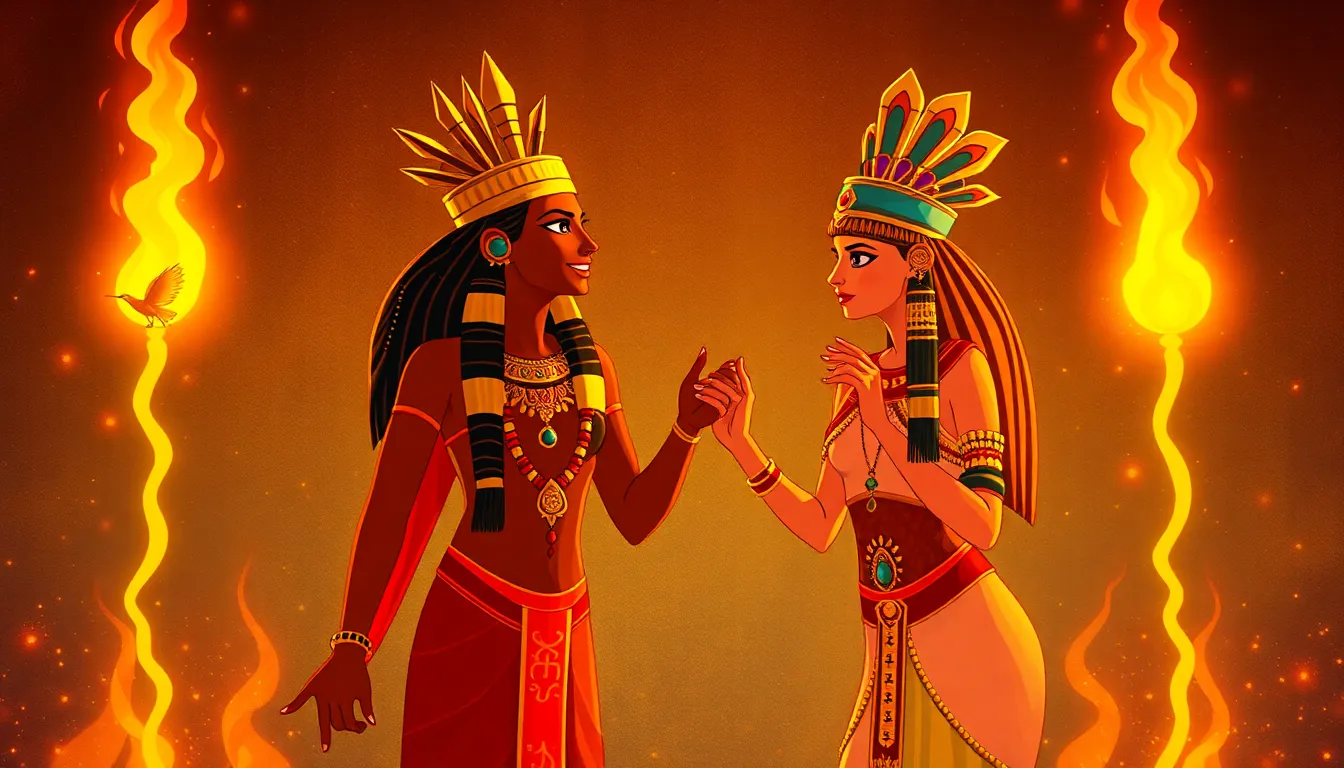The Festivals of Hathor: Celebrating Love and Joy
I. Introduction
Hathor, one of the most revered goddesses in ancient Egyptian culture, embodies love, beauty, and joy. As the goddess of music, dance, and fertility, she played a crucial role in the daily lives of the ancient Egyptians. Her festivals were not only occasions for worship but also vital events that fostered community bonds and celebrated the vibrancy of life.
The festivals dedicated to Hathor were significant gatherings that honored her and provided an opportunity for the people to come together in joy and celebration. Through various rituals and communal activities, the essence of love and happiness was expressed, leaving a lasting impact on society.
II. Historical Context of Hathor
The worship of Hathor dates back to the early dynastic period of ancient Egypt, where she was often associated with the sky and motherhood. Over time, her role expanded, and she became linked not only to fertility but also to music, dance, and joy.
Hathor was often depicted as a cow or a woman with cow horns, symbolizing her nurturing nature. Her significance in Egyptian mythology is profound; she was seen as a protector of women and children and played a role in the afterlife, offering comfort and joy to the deceased.
III. Major Festivals Dedicated to Hathor
A. The Festival of the Beautiful Reunion
One of the most notable festivals in honor of Hathor was the Festival of the Beautiful Reunion (also known as the “Dancing of the Spirits”). This festival celebrated the reunion of Hathor with her beloved, Horus, and was marked by elaborate rituals.
- Description and rituals involved: Participants adorned themselves in festive garments, engaging in music and dance, often reenacting the mythological love story of Hathor and Horus. Offerings of food, flowers, and incense were made at her temples.
- Historical significance and location of celebrations: The festival was particularly celebrated in Dendera, where one of the major temples dedicated to Hathor is located. It drew large crowds from nearby towns and villages, facilitating communal bonds.
B. The Festival of Drunkenness
Another prominent festival was the Festival of Drunkenness, which celebrated the joyous and uninhibited aspects of worshipping Hathor.
- Activities and customs associated with the festival: The festival included feasting, music, and consuming large amounts of beer and wine. It was common for participants to engage in exuberant dances and sing praises to Hathor.
- Symbolism of intoxication and joy in worship: Intoxication was seen as a way to connect with the divine, allowing worshippers to transcend their everyday lives and experience the joy and love embodied by Hathor.
IV. Rituals and Celebrations
A. Offerings and sacrifices made to Hathor
Offerings to Hathor were a crucial part of her festivals. Worshippers would bring various gifts, including:
- Food and drink, particularly beer and wine
- Floral arrangements
- Incense
These offerings were meant to please the goddess and seek her blessings for love, fertility, and happiness.
B. Dance, music, and artistic expressions during the festivals
Music and dance were central to Hathor’s festivals. Musicians played harps, flutes, and drums, creating an atmosphere of festivity. Dancers performed traditional movements that expressed joy and gratitude towards Hathor, often invoking her presence through their art.
C. The role of temples and sacred spaces in the festivities
Temples dedicated to Hathor served as the focal point for her festivals. The Temple of Hathor at Dendera was particularly significant, featuring elaborate architecture and sacred spaces for rituals. These temples were adorned with art that depicted Hathor’s mythology, enhancing the spiritual experience of the celebrations.
V. Symbolism of Love and Joy in Hathor’s Festivals
A. Exploration of love as a central theme in the celebrations
Love, in its many forms, was a central theme of Hathor’s festivals. The celebrations emphasized romantic love, familial bonds, and community unity. Participants expressed their love for one another through acts of kindness, sharing, and communal feasting.
B. Joy as a communal experience and its impact on social cohesion
The festivals were not just personal celebrations but communal experiences that strengthened social ties. The shared joy of dancing, singing, and feasting fostered a sense of belonging and interconnectedness among participants, reinforcing the importance of community in ancient Egyptian society.
VI. Modern Interpretations and Celebrations
A. Influence of Hathor’s festivals in contemporary culture
Although the ancient festivals of Hathor have ceased, their influence can still be seen in modern celebrations that prioritize love and joy. Various cultural events around the world draw inspiration from the themes of unity and celebration found in Hathor’s festivals.
B. Festivals and events inspired by Hathor in modern times
Contemporary festivals that celebrate love, such as Valentine’s Day, echo the spirit of Hathor’s festivals. Events focused on music and dance also reflect the joy and community bonding that characterized ancient celebrations.
VII. Lessons from Hathor’s Festivals
A. Insights on the importance of love and joy in human experience
The festivals of Hathor remind us of the timeless importance of love and joy in human experience. They teach us that celebrating these emotions fosters deeper connections and enriches our lives.
B. Reflections on how ancient practices can inspire modern celebrations
By reflecting on ancient practices, we can find inspiration for our modern celebrations. Incorporating elements of joy, love, and community into our lives can lead to more fulfilling and connected experiences.
VIII. Conclusion
In summary, the festivals dedicated to Hathor were vibrant celebrations of love and joy, deeply rooted in the cultural and religious practices of ancient Egypt. Their significance continues to resonate today, encouraging us to embrace love and joy in our personal and communal celebrations. By honoring the spirit of Hathor, we can enrich our lives and strengthen our connections with others.




